Arsenal FC finds itself at a pivotal moment following the unexpected departure of Edu Gaspar, who resigned from his role as sporting director after five years with the club. His departure has raised eyebrows, especially given the abruptness with which it occurred. Edu accepted a position within a multi-club network backed by Nottingham Forest’s owner, Evangelos Marinakis, leaving many employees at the club’s London Colney base in a state of surprise. Managing director Richard Garlick has taken charge of the selection process for a new sporting director, emphasizing the importance of continuity amid uncertainty.
Interim arrangements are in place with Jason Ayto stepping into the role temporarily. Arteta has publicly expressed his support for Ayto, highlighting his capabilities and underscoring the transitional phase the club is undergoing. This leadership structure is critical as Arsenal aims to maintain focus on its objectives while evaluating potential candidates for a more permanent appointment.
Despite the recent upheaval, Arteta is confident that the absence of a permanent sporting director will not hinder Arsenal’s plans for the upcoming January transfer window. Historically, this period is often tumultuous for clubs, but Arteta has downplayed expectations for significant activity. He has indicated that while the club remains open to surprises, it is not actively pursuing numerous transfers unless driven by injuries or considerable opportunities.
This strategic approach signals a cautious yet flexible mindset from Arsenal’s management. Despite the uncertainty surrounding the sporting director position, the club seems prepared to adapt quickly to any changes in circumstances, reaffirming their commitment to prudent decision-making.
Squad Availability and Injury Updates
Arteta’s focus also extends to the health and availability of his squad as they gear up for upcoming matches. Positive news has emerged regarding Gabriel Magalhães, who may feature against Everton after returning to training following a hamstring injury. Conversely, uncertainties linger around Riccardo Calafiori, who remains sidelined due to an unspecified issue. These developments demonstrate the ebb and flow of player availability that can significantly impact transfer strategies; the more stable the squad, the less likely drastic transfer moves become.
Intriguingly, the process for selecting a permanent sporting director involves considerable scrutiny. Arteta has hinted that the best candidate might already be in-house, suggesting that if Ayto continues to impress during his interim tenure, he could solidify his position. This insight reveals a potential commitment to nurturing internal talent—a strategy that could prove beneficial for the club’s culture.
Ultimately, Arsenal’s approach to its upcoming January transfer strategy reflects a balance between caution and proactive planning. The club’s hierarchy is keen on ensuring that their decisions align with the long-term vision for success while navigating the complexities that come with leadership transitions. As Arsenal presses forward, the interplay between strategic foresight and immediate tactical needs will undoubtedly shape the club’s trajectory in the months to come.

